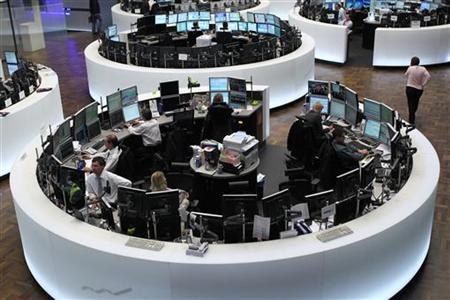NEW YORK (Reuters) - Stocks and commodity markets rallied on Tuesday on improving investor sentiment on growth in China, the United States and Germany, although persistent worries over the euro zone debt crisis limited some gains.
Shares on Wall Street jumped 1 percent in early trade as the market reopened from a long weekend extended by Monday’s U.S. holiday for Martin Luther King Day.
Global stocks were gained about 1 percent, while shares in Europe rose about half a percent.
Oil and metals prices were up as well, rising between 1 and 2 percent, as the positive sentiment over global growth coincided with news of potential supply issues and geopolitical tensions that heightened bullish fundamentals for those commodities.
Much of the gains were fueled by speculation that China may try to boost growth in the near term by tweaking its monetary policy after the country’s economy expanded at its weakest pace in 2-1/2 years in the latest quarter.
“Expectations are always a little irrational when it comes to China because of the track record we’ve seen. It’s definitely supportive (for the market) and the fact of the matter is they are still the engine of growth,” said Peter Kenny, managing director at Knight Capital in Jersey City, New Jersey.
Wall Street’s financial stocks advanced after a mixed earnings reports from major banks. Wells Fargo & Co (WFC.N) gained 2.7 percent to $30.40 after its quarterly profit topped expectations, offsetting an 11 percent profit drop for Citigroup Inc (C.N), which lost 3.8 percent to $29.56.
Around 10:30 a.m. EST (1020 GMT), the Dow Jones industrial average was up 124.19 points, or 1.00 percent, at 12,546.25. The Standard & Poor’s 500 Index was up 10.10 points, or 0.78 percent, at 1,299.19. The Nasdaq Composite Index was up 26.48 points, or 0.98 percent, at 2,737.15.
The KBW Bank index was off 0.35 percent, having risen nearly 11 percent for the year.
A gauge of manufacturing in New York State showed growth picked up in January, rising to the highest level in nine months as new orders and employment improved, the New York Federal Reserve said in a report.
German investor sentiment also posted its biggest ever monthly improvement in January, helped by recent upbeat data and hopes for the European Central Bank’s efforts to ease the region’s debt problems.
The improving German ZEW investor sentiment index, while encouraging, remained in negative territory, still indicating tough times ahead for the euro zone’s largest economy, economists said.
“The (ZEW) index is still consistent with a majority of investors expecting economic conditions to deteriorate in future,” said Ben May of Capital Economics.
The brightening economic news gave investors encouragement to move into riskier assets, lifting the euro and causing the U.S. dollar to drop against a range of currencies, including the Australian and New Zealand dollars.
The euro was near its session high of $1.2800, a 1 percent gain on the day, and well up from a 17-month low of $1.2624 hit last week.
Sentiment also got a lift from data showing euro zone consumer prices fell more than expected in December, the start of a retreat from a November peak that could give the European Central Bank more room to cut interest rates as the economy struggles with recession.
The pan-European FTSEurofirst 300 index of top shares was up 0.5 percent, touching its highest level since August 2011. Gains were led by car makers and mining companies.
The MSCI world equity index gained nearly 1.0 percent after rising in Asian trade on the Chinese data.
(Reporting by Barani Krishnan; Additional reporting by Richard Hubbard and Anirban Nag in London; Editing by Dan Grebler)


)
)
)
)
)
)
)
)
)



